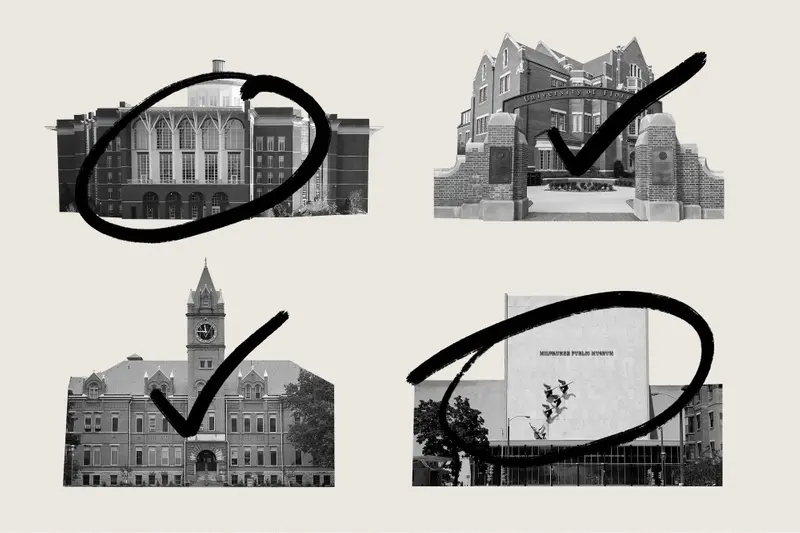ProPublica is a nonprofit newsroom that investigates abuses of power. This story is part of an ongoing series investigating the return of Native American ancestral remains. Sign up for ProPublica’s “Repatriation Project” newsletter to get updates as they publish and learn more about our reporting.
Dozens of Museums and Universities Pledge to Return Native American Remains. Few Have Funded the Effort.
Reporting from nearly 50 local newsrooms, based on ProPublica’s “Repatriation Project,” has sparked a wave of apologies and commitment to returning ancestral remains. But without funding for the work tribal nations could still face empty promises.


Series: The Repatriation Project
The Delayed Return of Native Remains
Until this year, the University of Kentucky’s William S. Webb Museum of Anthropology had never returned any of the more than 4,500 Native American human remains in its collections.
That is about to change.
Weeks after ProPublica published the “Repatriation Project,” the university told federal officials that 138 ancestral remains in its collection could be repatriated to three Shawnee tribes in Oklahoma and Missouri. The university also announced it will commit nearly $900,000 over the next three years and hire three more staff members to work on repatriations.
“This significant investment in staff and resources is a testament to the university’s steadfast commitment to Native nations and completing the sensitive process of repatriation with transparency, dignity and respect,” Kristi Willet, a university spokesperson, said in an email to ProPublica.
The University of Kentucky is among more than a dozen U.S. schools and museums that have pledged to redouble their efforts to return the human remains and belongings — in some cases numbering in the thousands — that were taken from Native American gravesites. Institutions have also publicly acknowledged the harm inflicted on tribal communities by continuing to keep ancestral remains and cultural items, including after the 1990 Native American Graves Protection and Repatriation Act called for them to be returned to tribes.
The wave of responses follow the launch of ProPublica’s series investigating the failures of the federal law.
In the three decades since the law’s passage, museums and universities repatriated fewer than half of the 210,000 human remains they initially reported holding, according to a ProPublica analysis of federal data from December. Ten institutions and federal agencies — including old and prestigious museums, state-funded universities and the U.S. Interior Department — hold about half of those remains, the analysis found.
Nearly 50 local and regional newsrooms have used the data analyzed by ProPublica to report on the progress of repatriation by institutions in their area.
“We want to get this done quickly. We recognize that tribal nations actually feel harm the entire time we’re holding their ancestors,” Catherine Smith, who was recently hired to coordinate University of Florida’s repatriation efforts, told WUFT, a public radio station in Gainesville.
Many institutions have for years told tribes that they will improve their work under NAGPRA and apologized for holding onto remains, said Shannon O’Loughlin, chief executive of the Association on American Indian Affairs, a nonprofit that has long advocated for tribes on repatriation. Meanwhile, museums and universities often continued to interpret the law in ways that allowed for them to resist repatriation and escape scrutiny, she said.
Now, with increased attention from the news media, institutions are facing more pressure to answer for vast collections of Native American remains. The public apologies and commitments to allocate more resources, including hiring staff, mark a shift for many institutions, she said.
“We’ve been told the same stuff, so I’m not sure that we should believe them now,” said O’Loughlin, a citizen of the Choctaw Nation of Oklahoma. “But, hey, they’re saying it in the public, so we’re gonna hold them to it.”
“More Work to Do”Tribes could be left with empty promises again, as only a fraction of those institutions stated they will devote more money and other resources to repatriation.
Among those promising to put resources behind their commitment to repatriate is the Tennessee Valley Authority, which told ProPublica that it also has drafted a federal notice that will enable tribal nations to repatriate the remains of nearly 5,000 Native Americans. Federal records show that the utility has at least 3,500 remains in its collections; ProPublica learned that the TVA recently found roughly an additional 1,500 ancestors in its repositories at the University of Tennessee-Knoxville, the University of Kentucky and the University of Alabama. Those ancestors hadn’t previously been reported under NAGPRA, as required by the law.
Most of the ancestral remains in TVA’s collections are stored at those three universities, which, along with the TVA, are among the 10 institutions that ProPublica identified as holding the largest number of remains of Native Americans in the country.
Nine of those 10 institutions have stated to ProPublica that they are committed to returning remains and cultural items to tribal nations. Indiana University has not responded to ProPublica’s requests for comment.
The speed and scale of the TVA’s effort to repatriate everything in its collections concerns some tribal historic preservation officers and cultural directors.
“We’ve never had a collection of this magnitude be left to have the tribes decide,” said Miranda Panther, NAGPRA officer for the Eastern Band of Cherokee Indians. “Usually we make decisions before transfer of legal control has occurred. So I’m not sure how this process is going to work.”
Archaeologist Megan Cook, who recently became a NAGPRA specialist for TVA, said that consultations will continue with tribes and that the TVA is committed to repatriation “for the long haul.”
Reporting from two Washington state outlets, The Inlander in Spokane and The Bellingham Herald, as well as Axios prompted the president of Western Washington University to issue a statement in response to ProPublica’s investigation.
Last year, the university made the remains of three Native Americans available for return to the Swinomish Indian Tribal Community, according to federal data analyzed by ProPublica. It is the institution’s only repatriation since the law’s passage. The university said in an email that it still holds the remains of at least 63 Native Americans.
“We recognize that we have more work to do to ensure that the ancestral remains we currently house are returned home,” Sabah Randhawa, the president of WWU, said in the statement. “We recognize the need for securing additional expertise and resources.”
A school spokesperson told ProPublica that university leaders are still discussing how much funding, and what expertise, is needed.
ProPublica’s investigation also led to a report by South Florida public radio station WLRN that revealed one museum’s intention to return all of the human remains and funerary objects in its collection to the Seminole Tribe of Florida. ProPublica found that HistoryMiami Museum is one of about 200 institutions across the country that have repatriated no human remains.
HistoryMiami CEO Natalia Crujeiras told WLRN that the museum didn’t know which tribe to repatriate to and that no tribe had claimed them. That began to change in 2019, after the museum learned the Seminole Tribe of Florida planned to claim more than 100 ancestral remains in the museum’s collection.
The museum identified some as belonging to Calusa and Tequesta cultures, though it listed all of the remains as “culturally unidentifiable” in an inventory submitted to the national NAGPRA office in the 1990s. Until 2010, the federal law only mandated the repatriation of remains and items that institutions deemed “culturally affiliated” with a modern tribe.
“It’s really upsetting that they still disassociate the Seminole Tribe of Florida from our ancestors,” Tina Osceola, the tribal historic preservation office director for the Seminole Tribe of Florida, told WLRN. “I don’t think HistoryMiami or anyone else should have the power to tell the Seminole Tribe of Florida who their ancestors are. They have our ancestors. End of story.”
ProPublica’s reporting and database also spurred an investigation by Hearst Connecticut Media Group that found 90% of still-unreturned remains in that state are held by the Yale Peabody Museum of Natural History. According to the news outlet, the museum said it will hire two more full-time staff members to work on repatriation “to meet its own goals and the anticipated federal rule changes.”
A museum spokesperson told ProPublica that it has also secured additional funding for tribal consultations but declined to specify the amount. “We are completely committed to these efforts,” museum Director David Skelly said in a statement.
Student journalists have also used ProPublica’s data to hold their own universities accountable.
At Brown University, student reporting found that in 2018, the campus’ Haffenreffer Museum of Anthropology made the remains of 10 ancestors available to the Narragansett Indian Tribe to repatriate. But the tribe’s historic preservation director, John Brown, told The Brown Daily Herald that he wasn’t aware of the notice, and that the museum hadn’t adequately consulted with the tribe before publishing it in the federal register.
The reporting prompted an apology from the museum’s director, Robert Preucel, to the Narragansett Indian Tribe’s historic preservation office. Preucel told the Brown Daily Herald that the museum is “doing everything we can to repatriate all of the human remains” it holds.
At the University of Montana, a spokesperson shared similar comments with the Montana Kaimin, saying that repatriation is a “top priority” for the school, even though completing the work will “take time.”
ProPublica's reporting sparked an investigation by the campus newspaper in February that found the university has no one on staff who is entirely focused on repatriation efforts, despite having been awarded a federal grant last year to hire an employee for such a position. Dave Kuntz, the university’s spokesperson, told ProPublica last week that the school has not been able to fill the position.
Institutions’ Statements on RepatriationHere’s what other institutions have said in response to recent reporting on repatriation. The figures reported below are from a ProPublica analysis of federal repatriation data from December:
Texas State University’s anthropology department Chairperson Christina Conlee to the University Star: “Our goal here is to repatriate these remains and we’re working towards that. We remain in compliance with the law and we hope that we will make good progress going forward.” The university reported still having the remains of at least 100 Native Americans.
Milwaukee Public Museum President and Chief Executive Ellen Censky in a statement to the Milwaukee Journal Sentinel: “While it is a long and complex process, our goal is to repatriate all ancestral remains and associated cultural objects identified under NAGPRA.” However, the museum is preparing to move to a new building in 2026, making a timeline to repatriate tough to “pin down.” The museum reported still having the remains of at least 1,600 Native Americans.
University of Texas San Antonio spokesperson Joe Izbrand to Axios and the Paisano, a student publication, regarding remains held by the university’s Center for Archaeological Research: “It is our intention to repatriate all of the remains and objects to the rightful parties, and we are working methodically to facilitate their return, enabled in part by a grant from the National Park Service.” The university reported still having the remains of at least 200 Native Americans.
Penn Museum at the University of Pennsylvania Director Christopher Woods to The Philadelphia Inquirer: “This is incredibly sensitive, time-consuming work. Each case is unique and deserves its own consideration. It is essential to proceed with the utmost care and diligence, as we confront our own history of racism and colonialism. That work is ongoing.” The university’s museum reported still having the remains of at least 400 Native Americans.
Temple University Anthropology Laboratory and Museum in a statement to the Inquirer: “We want to make clear that 100% of the ancestors at Temple University are available for repatriation, and we are actively working to accomplish this.” The university reported still having the remains of at least 100 Native Americans.
A New York University statement to Washington Square News, an independent student newspaper, in a report about remains held by the NYU College of Dentistry: “We did not get started on the efforts to audit and repatriate the remains as early as we should have.” The College of Dentistry reported still having the remains of at least 100 Native Americans.
Submit A Tip We take your privacy seriously, and we will contact you if we wish to publish any part of your story. We may not be able to respond to everyone, but we read each submission and they help inform our work.
If you can’t access our form, contact our reporters at [email protected] or (206) 419-7338.
ProPublica is a nonprofit newsroom that investigates abuses of power. This story is part of an ongoing series investigating the return of Native American ancestral remains. Sign up for ProPublica’s “Repatriation Project” newsletter to get updates as they publish and learn more about our reporting.
ProPublica is a nonprofit newsroom that investigates abuses of power. This story is part of an ongoing series investigating the return of Native American ancestral remains. Sign up for ProPublica’s “Repatriation Project” newsletter to get updates as they publish and learn more about our reporting.






